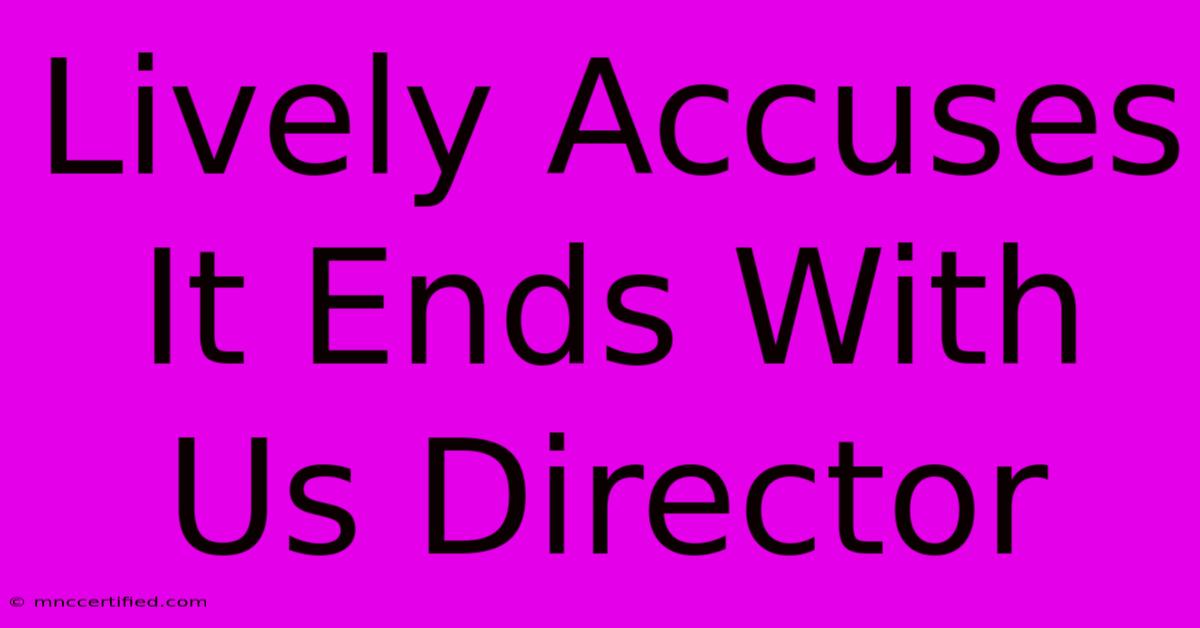Lively Accuses It Ends With Us Director

Table of Contents
Lively Accuses "It Ends With Us" Director: A Deep Dive into the Controversy
The recent adaptation of Colleen Hoover's bestselling novel, "It Ends With Us," has ignited a firestorm of controversy, largely fueled by accusations leveled by actress Blake Lively against the film's director. While specifics remain shrouded in secrecy due to ongoing legal proceedings and non-disclosure agreements (NDAs), the situation highlights critical issues within the film industry regarding power dynamics, creative control, and the ethical treatment of actors. This article will delve into the known details of the accusations, exploring the potential implications and broader context of the situation.
What are the Accusations?
At present, the exact nature of Blake Lively's accusations against the unnamed director remains largely undisclosed. Legal battles and NDAs prevent a full public airing of the details. However, various reputable sources suggest the allegations involve professional misconduct, encompassing claims that could range from unprofessional behavior on set, creative disagreements leading to hostile environments, to potentially more serious allegations. The lack of specifics fuels speculation and amplifies the controversy, leaving audiences to piece together information from fragmented reports and online discussions. The ambiguity underscores the challenges faced by actors, particularly high-profile ones, when navigating power imbalances in the industry.
The Power Dynamics at Play
The film industry, despite its glamorous façade, often struggles with unequal power dynamics. A-list actors like Blake Lively hold significant influence, yet they remain beholden to studio executives and directors who ultimately control the creative vision and on-set environment. This imbalance creates a fertile ground for abuse, where accusations of misconduct may be silenced or ignored for fear of professional repercussions. Lively's accusations, even without detailed specifics, bring this power imbalance to the forefront, prompting a critical conversation about the need for greater protection and accountability for actors.
The Impact on the Film's Reception
The controversy surrounding Lively's accusations has undoubtedly impacted the reception of "It Ends With Us." Initial excitement surrounding the film adaptation has been overshadowed by the ongoing scandal. Online discussions are dominated by debates about the accusations, with many viewers expressing uncertainty about whether to support the film given the allegations. This demonstrates the far-reaching consequences of on-set misconduct, affecting not just the individuals involved but also the broader commercial success and cultural impact of the film.
Beyond the Headlines: A Broader Look at Industry Practices
This incident serves as a stark reminder of the systemic issues within the film industry. While this specific case remains shrouded in some mystery, it highlights the need for:
- Stronger protection for actors: Improved industry regulations and better enforcement of existing laws are crucial to prevent exploitation and ensure safe working environments.
- Transparency and accountability: Open dialogue and willingness to address misconduct allegations, regardless of the individuals involved, is vital for fostering a healthier industry.
- Breaking the culture of silence: NDAs often shield perpetrators and prevent victims from speaking out. Reform is necessary to encourage reporting and justice.
Conclusion: The Long Shadow of Allegations
The accusations against the "It Ends With Us" director, while shrouded in some mystery, underscore significant issues within the entertainment industry. The lack of specifics does not diminish the importance of the allegations, rather, it highlights the need for systemic change to protect actors and ensure a healthier, more equitable work environment. As the legal processes unfold, the situation will undoubtedly continue to generate discussion and contribute to the ongoing conversation about power dynamics, accountability, and the ethical treatment of individuals within the film industry. The long-term impact of this controversy will be felt far beyond the box office numbers of "It Ends With Us."

Thank you for visiting our website wich cover about Lively Accuses It Ends With Us Director. We hope the information provided has been useful to you. Feel free to contact us if you have any questions or need further assistance. See you next time and dont miss to bookmark.
Featured Posts
-
Newcastle United 4 0 Town Win
Dec 22, 2024
-
Liam Kelly Debut Match Highlights
Dec 22, 2024
-
Brown Catches Five Passes Vs Chiefs
Dec 22, 2024
-
Palace 0 2 Arsenal Jesus Scores Twice
Dec 22, 2024
-
Warriors Vs Timberwolves Game Highlights
Dec 22, 2024